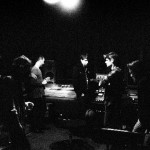 Oiseaux-Tempête’s core consists of Frédéric D. Oberland and Stéphane Pigneul, two multi-instrumentalists, who began to jam some five years ago, when they were still playing in numerous other groups. Rather spontaneously, they developed their typical style, moving between down-tempo rhythms, droning guitar riffs, playful saxophone parts and all sorts of electronic and accoustic adjuncts. If the two of them conceive their band as an open project, this does not only refer to the numerous guest musicians, who participated in their records and mainly on their new album “AL-’AN !” (Sub Rosa 2017) and extended their style to a high degree. Oiseaux-Tempête are also passionate travelers, and their previous destinations – Greece, Turkey, Lebanon – lead one to assume that the respective places and their people, things and events are more than mere motives, but factors that actively shape the music. Most of all the Mediteranean Sea as a geographical and somehow also mythical entity has an almost personal presence on all recordings of the band. In the following interview, you get to know Frédéric and Stéphane as free spirits and passionate music lovers with great enthusiasm for everything they touch.
Oiseaux-Tempête’s core consists of Frédéric D. Oberland and Stéphane Pigneul, two multi-instrumentalists, who began to jam some five years ago, when they were still playing in numerous other groups. Rather spontaneously, they developed their typical style, moving between down-tempo rhythms, droning guitar riffs, playful saxophone parts and all sorts of electronic and accoustic adjuncts. If the two of them conceive their band as an open project, this does not only refer to the numerous guest musicians, who participated in their records and mainly on their new album “AL-’AN !” (Sub Rosa 2017) and extended their style to a high degree. Oiseaux-Tempête are also passionate travelers, and their previous destinations – Greece, Turkey, Lebanon – lead one to assume that the respective places and their people, things and events are more than mere motives, but factors that actively shape the music. Most of all the Mediteranean Sea as a geographical and somehow also mythical entity has an almost personal presence on all recordings of the band. In the following interview, you get to know Frédéric and Stéphane as free spirits and passionate music lovers with great enthusiasm for everything they touch.
To start with something common: How did Oiseaux-Tempête happen? Was there a certain idea, a tune or an atmosphere, that didn’t seem to fit in the groups you had until then?
Frédéric D. Oberland: The roots of the band lie in pure instinct and spontaneity. In 2012, I travelled to Greece with photographer Stéphane Charpentier; back to Paris with some rushes and field recordings, I asked Stéphane Pigneul, my sonic brother, if he would like to join the adventure. We were not talking about creating a new band then, we just liked to jam around ideas and to try something else. At the time, Stéphane and I were playing with Le Réveil des Tropiques (a crazy full improv psych band) and in FareWell Poetry (a collective intertwining dark soundscapes with analog films and poetry). Now 5 years later, I can say that Oiseaux-Tempête is straight in the middle of all these directions, and even pushed our limits as musicians further away. We’re always using improvisation as a primal gesture in all our recordings; then for the concerts we ‘learn’ how to play the songs, including new moments of improvisation or free interpretation, like a room with flexible walls.
Stéphane Pigneul: The only huge difference between Oiseaux-Tempête and the other projects we had together or not, was the musical chemistry that Fred and I shared. Everything was easy with no one to complain about our directions, skills, tastes. If I start with chords or a bassline, he will follow, if he got his riff, I will find a way to enhance it, without thinking too much. It puts you in a very confortable position as a musician, in a familiar bubble of sound, where everything is possible, from tests and trials to achieved concepts and crazy stuff.
This is, as I think, the most important thing in music, to be free.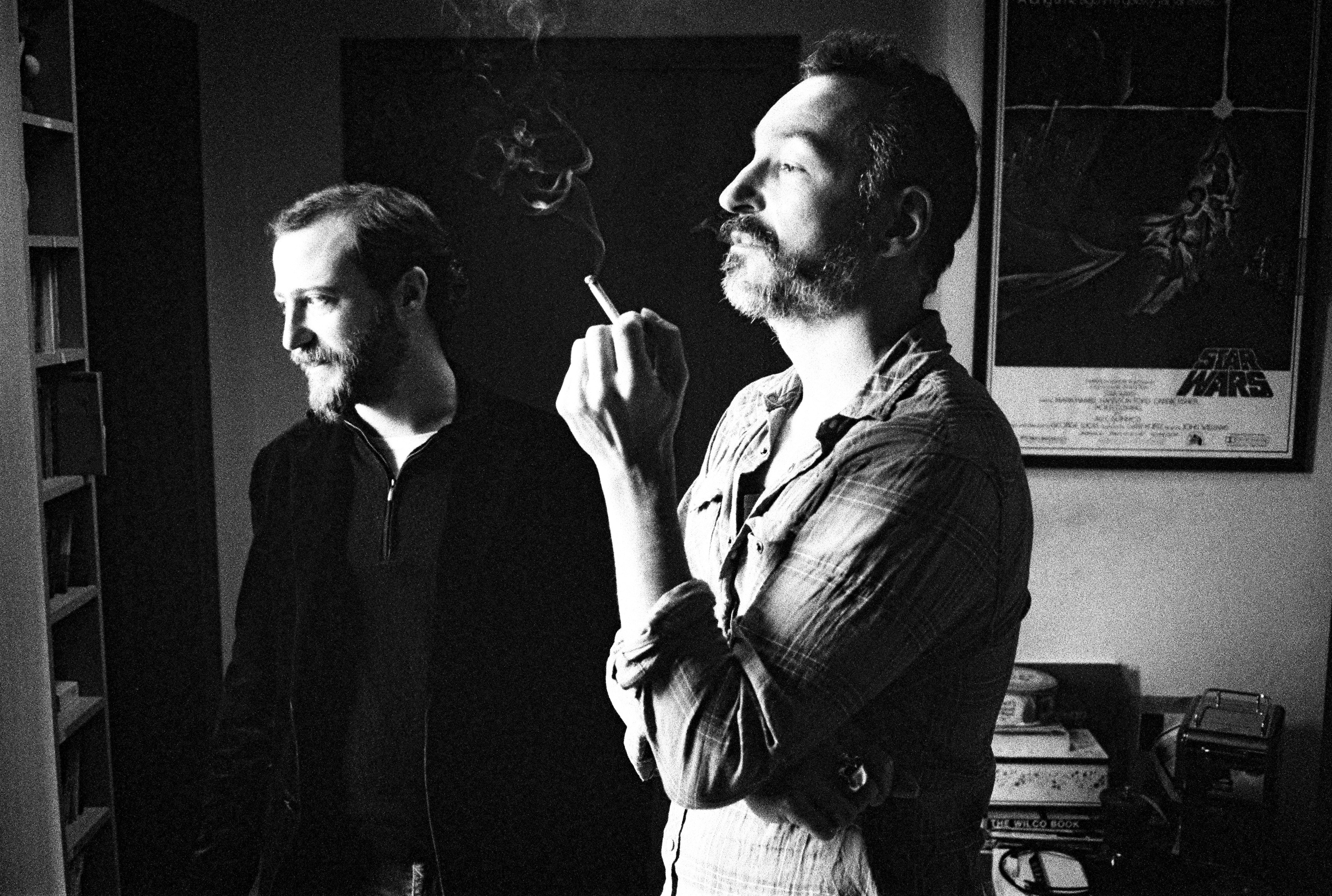
You play(ed) in various bands besides Oiseaux-Tempête, and also your collaborators mostly have their own renowned projects. What would you say are the major qualities and experiences of all these people, that flew into Oiseaux-Tempête and make the band what it is?
Frédéric: Yes, since the beginning we’re inviting guests and collaborators, whose work we love, to participate with us, for a track, a specific album or alive performances. Like the improvisation process we were mentioned first, this is another way to keep the band and our sound open, to try, to experiment and to have fun. First of all, these collaborators are our friends, and we share the idea that music is a vital spark.
Stéphane: It is as if our magic link was contagious, so it’s always fun and easy to jam with our friends or the respected musicians we wanted to play with. Paul, Sharif, Christine, Jos, Charbel or Abed told us so. What came out once again with the last album, is far beyond anything that we could expect – thanks to their trust, skills and friendship.. The family is growing bigger and bigger!
Most of your recordings as Oiseaux-Tempête have to do with a trip to another country, the latest album “Al-’An!” also includes contributions by various Lebanese and Palestinian musicians. An insight into specific moods, discourses and problems of the very place always plays a role.. As you founded the band, was there already a concept about these things, or did this just happen once you started?
Frédéric: There is no concept. But there was some background: The trips to Greece, we did for the first album, as the Peninsula was struggling hard with the economic and social crisis, the ones for ÜTOPIYA? to Istanbul on the Gezi insurrection’s ashes, or the recent journey to Lebanon – this tiny country surrounded by three impenetrable borders (Israel, Syria in war and the Mediterranean Sea) – where we recorded half of our last album, AL-’AN!… We are interested and curious about these things -human, politic, social, cultural- and we bring all of our everyday experiences into our music. I can’t – and I don’t want to – divide myself as the musician and the human being. What would be the point to do so? I think art should be connected with real life as much as with dreams. That’s part -at least for me – of the DIY / alternative spirit and something we all noticed in the Beirut scene for example: with Charbel (Haber), Sharif (Sehnaoui), Abed & Ali from Two Or The Dragon, we were all sharing the same melancholy, building our great expectations in the now.
Stéphane: The desire to go further after Frédéric’s journeys to Greece or Turkey was just logical. He joined me to Sicily where I used to live for a while during the UTOPIYA? process. Suddenly, the fact that we were doing all our albums around the Mediterranean Sea and our link to this area popped up and pushed us to Lebanon. Again, it was a natural process. We just gave it a try.
So you would also say that the Mediterranean Sea in its separating and connecting nature plays a major role in your work?
Frédéric: It is the Alma Mater. Personally, it’s the first sea I saw and swam in when I was a kid, the one my grandfather is originally from – a little village in the Venetian area. That’s kind of hard to explain, why you’re feeling at home somewhere, even when you’re not living there everyday; it is just how I feel when I’m close to this sea, wherever the specific country is… More broadly, the Mediterranean basin is an exciting cradle of civilizations – for Europe, the Balkans, Middle-East, Africa – and almost 10.000 years of history, empires, democracy, migration, cultureS… It seems/ed as a natural starting point for us to try and see things differently from what you can study at school (borders and shit), see on T.V or listening from short-term political speeches without memories… This geographic basin is a huge melting-pot of so many different influences. We do have so much things in common, and even still so much things to learn from our differences.
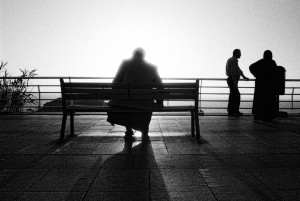 Stéphane: The fact that it is some cradle of civilization, the beginning of the first and strong republics speaks to us. Nowadays, it’s so obvious that democracy is weak and threatened, and mistreated by one of the most powerful persons in the world. Something’s going on… It’s so fucked up! We wanted to see by our own eyes and come back with all the light we could find. Which was huge!
Stéphane: The fact that it is some cradle of civilization, the beginning of the first and strong republics speaks to us. Nowadays, it’s so obvious that democracy is weak and threatened, and mistreated by one of the most powerful persons in the world. Something’s going on… It’s so fucked up! We wanted to see by our own eyes and come back with all the light we could find. Which was huge!
I know the situation of French society mostly via our own media, but my impression is, that the inter-cultural aspects of life were never so intensely discussed as in recent years, and that to a large extend, the split in the society is marked by these topics. How much do the later developments in politics and society influence what you do as musicians?
Frédéric: You’re right, that’s a big topic here since fifteen years or so, with a lot of manipulations from local politicians and their marketing teams to push this subject on the highlight: ‘be careful, close your borders or you will loose your identity’. I guess we’re all experiencing almost the same in Europe now: the rise of a new extreme right bringing non-sense on the public debate as if it was some hidden truth, maintained by most of the other politicians who are pyromaniac enough to play with those nauseous xenophobic ideas without any real will to destroy it… Our identities are so complex, so multi-something. How many Europeans, how many French do not have parents or grandparents coming from somewhere else, with different habits, cultures, even history or religion? How many migrants are coming to Europe now for obviously ‘taking profits’ from the European countries? That’s just bullshit. How is it possible to think like that, as if someone escaping from war and the risk of death in his own country just to find a shelter, would actually be the guy destroying our welfare state? Please… Neo-liberalism didn’t need wars and migrants to kill first our social state on the altar of capitalism and short-profits. Of course music, art or whatever will not change all these things, but it can help, even in the manner you’re doing it, to bring light to other points of view and ways of being alive, even for few people, even in a ‘niche’ thing. Starry skies are made of tiny little sparks.
Stéphane: As a musician, it is trivial and obvious to think that you must act as a hard defender of civil rights, freedom of press, cartesian and scientific facts, kindness and respect towards the different communities, women and and on and on… What’s happening is non-sense. A joke that I hope will end soon. Not only in France, but as I said, in all the contemporary democracies. I got great expectations about a Trump impeachment. It would be a fantastic lesson of hope and cartesian success for democracy.
Are the music communities and the ways to work very different in various countries and cities, and if yes, did this have an effect on the way you worked on your recordings?
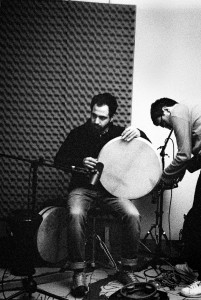 Frédéric: I don’t know… We never thought like that during the concerts and the studio sessions. The musicians we played and recorded with in Beirut are first awesome artists before being from Beirut or Lebanese or belonging to any specific community… We were sharing life together, hanging out, travelling; we became friends. I guess the music we’re playing is based on the listening-to-each-other process, on respect, which is helping the fluidity of the whole a lot. For “AL-’AN!”, we made of course some big researches about Middle-East and local music before travelling there, but we were so delighted to see that the actual underground scene in Beirut is so well connected to the worldwide scene. We had albums, artists and even gear tastes in common in our backgrounds, that helps!
Frédéric: I don’t know… We never thought like that during the concerts and the studio sessions. The musicians we played and recorded with in Beirut are first awesome artists before being from Beirut or Lebanese or belonging to any specific community… We were sharing life together, hanging out, travelling; we became friends. I guess the music we’re playing is based on the listening-to-each-other process, on respect, which is helping the fluidity of the whole a lot. For “AL-’AN!”, we made of course some big researches about Middle-East and local music before travelling there, but we were so delighted to see that the actual underground scene in Beirut is so well connected to the worldwide scene. We had albums, artists and even gear tastes in common in our backgrounds, that helps!
Stéphane: I don’t think so. The process that kicks you and pushes you to make music is probably universal. It’s kind of a fire eater, a passion that sometimes burns the everyday day administrative work, that makes you meet other people, embrace contradictions, push new boundaries. We were all on the same page, maybe because yes, we’re sharing the same roots and musical influences, But most of all because we all wanted this to happen. We are not lazy when we work but we just jump into it, smile and summon the magic!!!
In “Al-’An!”, elements of western origin like rock and metal are connected with Arabic influences. Did you have a sort of synthesis in mind, or are you more focused on the juxtaposition of the several aspects?
Frédéric: That’s what happens in the studio in a spontaneous way. We arrived at Tunefork studio in Beirut completely free, just wanting to give the best of what we could do. Big parts of the improvisations we recorded there together with the different teams were so blissful and were finally going further than we could expect… Then when we jumped back to Brittany, France, for some overdubs and extra recording session, we gave some extracts from these Beirut sessions to our drummer Sylvain and to Paul aka Mondkopf to listen to. After a small break, we went back with Stéphane to listen to the complete sessions and we started to edit -as in a movie- and to build the whole album. It took some months to find the proper way to give birth to the opus. Our way of working is empiric, without a written scenario…
Stéphane: Paul (Mondkopf) uses to say that we got these kinds of influence, he goes like this : « there’s some stoner or doom influence in your music ! » . He’s a specialist of genres! He will tell you what is Black Norwegian or Death or Grind or Indie influences in your music! I love this guy! He’s so funny, and cleaver and incredibly gifted. For our part, I have to admit that I got no clue from where all these influences are coming. Apart OM, Earth or Sunn O))), we never listen to this kind of music. For the editing phase, Fred and I worked in his Magnum Diva studio, listening carefully to the different takes, but most of the time it’s just only one take because everything is improv. Then we’re deciding if we have to cut it, or let it drift off, or trying some layers of pieces. The only rule is: it has to work easily, it must flow naturally. As the years are passing by, we’re becoming harder and harder with ourselves.
To start a new collaboration always contains the risk, that the ideas might not correspond, and I’m sure in an intercultural co-operation this might be even more the case. Do you enjoy this somehow “risky” side of the new, when you work abroad?
Frédéric: Of course! You need to go out of your comfort zone to make something new and magical happening, as to keep going the continuous pleasure of having some band. Failure -or the risk of failure- is always part of the process, but who cares if you find something in the way? That’s our purpose, and why we are playing music.
Stéphane: That’s the deal of the project. The essence of the band I think. We never understood how bands could play the same songs over and over again on stage. Our approach is to dive with different people, new sounds, new locations that could inspire us and put us in danger. Of course it’s scary. But we have faith and we put an entire trust in the people in the room when we all play together. That’s the starting point. Giving trust, joy, pleasure and most of all, fun to everyone, making everyone involved proud of a big everything. At least, we’re trying! Ahahahah!
I guess your improvisational approach is quite beneficial to the variety of the music and the stylistic directions…
Frédéric: Stéphane, I, as a lot of our collaborators, are multi-instrumentalists. For example, the improv will not go in the same direction if I’m playing the saxophone rather than the guitar, if Stéphane is playing synths instead of his Fender VI, if there is a buzuk, some vocals, machines, specific percussion or ondes martenot somewhere! You have to focus on the tone of the instruments, about the sound you’re actually having while playing with the other guys, about the space and frequencies, about what you want to say inside this collective thing in the now. These are the ‘rules’. We are music lovers, we do listen to a lot of music beside any genres. As a player, you have to dig to extend your language!
Stéphane: Yes, it just popped up, like this. We never said « let’s try something in the way of… ». The key is that everyone is free to do whatever he wants to play or to try. In my opinion, this is the most important thing. Having this kindness and familiarity between the people, it’s just pushing you to do the best you can. No fear, no worry. I know my friends will like this. And if it’s not working, we feel it instantly. No big deal. We stop then, take a rest and move on. I’ve got dozens of memories like this. Searching for the right approach during the improv itself. Someone will start something, and you see people in the studio grabbing an instrument and drop it after ten seconds, then taking another one. And suddenly it works! Then everyone is smiling and feeling that we’re catching the right fish. It’s one of the best feelings in the everyday life of a musician.
How did you decide to focus on Beirut? Have you been (and played) there before?
Frédéric: I knew Charbel for years from Scrambled Eggs and some soundtracks he made for Lebanese movies like the ones of Nadim Tabet. We also knew the work of Sharif who was living in Paris for a while and playing in Les Instants Chavirés improv scene. We sent them some mails with our previous albums, talking about our project to come to Beirut to record the basis of the new one. They were so excited! Lebanon, with his great artistic scene, geography and specificities seemed the perfect spot to try something with local musicians.
Stéphane: We did also contact Ziad Nawfal and Roy Arida, they gave us plenty of links about music, people, movies, books.. We never went to Lebanon before, neither ever played over there. All we knew about it was what we could remember from the news when we were children, or stories from old Lebanese friends. We wanted to go further into the Mediterranean area. After all we read and watched and listened, we were a bit prepared for what we could expect. But all this was so far from the reality!
The traces of Beirut and Lebanon on “Al-’An!” are manifold, you have local moods and topics on the vocal side of it, but also typical sounds from the streets and a variety of musical ideas like instrumentation and styles. Which were the things that impressed you most in this country?
Frédéric: “AL-’AN!” includes life extracts from our travel diary into Beirut and Lebanon. Excerpts from conversations, interviews, sounds/noises from all day life, or even a track like ‘A l’Aube’ which was a short live improv recorded on the terrace of the flat we were renting with our friends As Human Pattern (the video-artists duo who joined us for the journey and the project). The generosity we all felt in Beirut since we arrived was so deep, so warm. We felt embraced by the city. Despite the chaotic situations you may notice at first, you get this so-strong will to live which resonated a lot in our minds.
Stéphane: The joy and the happiness of the youth, but also the civil war stigmas and the hidden sorrow…
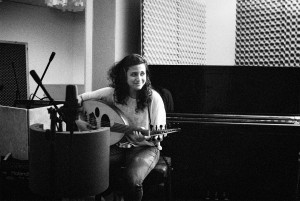 There are a variety of moods and atmospheres in the album, but even if there are moments of chaos and outburst I have experienced it’s mood as peaceful and friendly. Can you agree, and if yes, where would you think might this come from?
There are a variety of moods and atmospheres in the album, but even if there are moments of chaos and outburst I have experienced it’s mood as peaceful and friendly. Can you agree, and if yes, where would you think might this come from?
Frédéric: From the people we met, from the joy and the fun we all had together. This is the key. Maybe in our unconscious we also wanted to bring in some of the light that we also felt inbetween those outbursts? That was the mood, anyway, and we surfed it!
Stéphane: Very happy you feel this way. This is our main idea I can tell now after five albums. We try to catch the hope, the light, the lust for life underneath the chaos, ugliness and maybe dark feelings, when you first touch ground on Earth (if you’re an alien of course ! Ahahahah).
Late Palestinian poet Mahmoud Darwish seems to be a big inspiration for the album, as it’s subtitle and one of the songs are taken from his poetry. How did you discover this author, and which qualities of his works did inspire and impress you?
Frédéric: I discovered Darwish’s poetry early 2000′s with his book ‘Murale’ (‘Mural’) translated into French by Elias Sanbar. A friend of mine gave it to me saying: ‘this will speak to you’. And it obviously -and deeply- did. Mahmoud Darwish has this so specific and personal feeling that made everything he wrote kind of universal. In ‘Mural’ he evokes the loss of his homeland and the pain of dispossession, exile and loss. He jumps from politics to love and to different mythologies, Quran, Bible, Ancient Egypt, refers to Al Maari (a blind Arabic poet from the 10th century) or to French author René Char. Darwish is one of the greatest poets of the last half-century, and a source of pride for all Palestinians; he could have spoken to the whole Arabic world – and further, in Europe, in the US, etc – with his so powerful voice (you can actually hear him in our track ‘The Offering’). This guy used to perform poetry in stadiums, embracing all the communities, could you imagine that? His voice and his wisdom are missing so much nowadays, I guess…
Stéphane: To be honest I discovered Darwish very late, maybe around 2011 when Rodolphe Burger (a French « legend » guitarist) did a show around his poetry. I never really liked his music but it was a tribute also to Alain Bashung, whom instead I always loved. So the connection was done like this. I cherish the idea of ricochets in music. You listen to someone inspired by someone else, and if you’re curious, you discover a lot of artists. As a teenager I discovered so many things through Bowie… The funny thing is that Youmna Saba, who also joined us on the record, did also join Burger on the album I mentione. The wheel….
Whilst collaborators Sharif Sehnaoui and Tamer Abu Ghazaleh are quite renowned over here, musicians like Charbel Haber or Youmna Saba are still relatively unknown. Who are these people and what can you tell us about their work?
Frédéric: Well, Sharif Sehnaoui is one of the co-founders of awesome bands like Karkhana, “A” Trio, Omar Orchestra and Johnny Kafata Anti-Vegetarian Orchestra, and is regularly collaborating with Alan Bishop, Sam Shalabi, etc. He’s also running the essential Irtijal festival, and the labels Al Maslakh and Annihaya. We discovered Tamer Abu Ghazaleh through the stunning work of Alif (Nawa Recordings), a panarabic band also including Khyam Allami and Maurice Louca; he got some great solo work as well and is running the Egyptian Mostakell label. Charbel Haber is an unmissable figure of the new Beirut underground scene, he co-founded bands like Scrambled Eggs, Malayeen, The Bunny Tylers, Johnny Kafta Anti-Vegetarian Orchestra… He putted up few solo albums on labels like Discrepant or Scum Tapes and is regularly composing for cinema (Ghassan Sahlab, Khalil Joreidge & Joanna Hadji Thomas) and theater (Rabih Mroueh & Lina Saneh)…
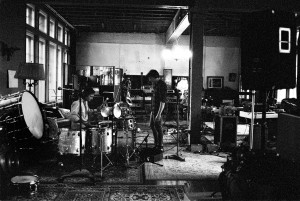 Stéphane: To come back to Youmna, she just released a new album (Arb’een (40)) and she’s one of the kindest person I ever known.
Stéphane: To come back to Youmna, she just released a new album (Arb’een (40)) and she’s one of the kindest person I ever known.
But we also collaborated with the insanely gifted musicians Two or The Dragon, Ali El Hout and Abed Kobeissy. A noise duet made of an electric buzuk and percussion. They were with us during the last tour. I can tell that they are the best musicians I ever met with Paul and Charbel and Sharif and… my god they were all so good !
Many Europeans seem to have an idea of the Middle East as a homogeneous area. When you then tell about Beirut and mention experimental music and arts, yoga courses or a gay scene and club culture, they’re often irritated and seem not to believe that this exists. What do you think are the hardest clichés about this region that Western people should overcome?
Frédéric: They should just avoid all the clichés in general in their life! That’s crazy how canned images and pre-conceived ideas could still be so powerful in a 2.1 world! There are so many ways now to find the right info or at least several documented points of view on things happening/ed here and there… I guess loads of the clichés we can hear from some Western people about Middle-Eastern countries are coming from the same soil of racism, fear, ignorance and confusion. Never forget to open some history books and to remind how European, US and Russian politics share a huge responsibility in collusion with the nightmare, that some of the local population are actually experiencing in the Arab world… The Middle East is as varied as Europe, and civilizations just begun here many centuries before we followed in the Western world! Of course, you will not go right now to have some funky trekking in Syria, but you can travel in a lot of countries of the Middle East, in Lebanon, Jordan, Iran, parts of Egypt, Israel and meet a lot of great people having often a far more pragmatic tolerance and a warm welcome that the one we’re endowing ourselves here!… Get out of your comfort zone and enjoy how little you are! ![]() (Oh, and the food is so wonderful!).
(Oh, and the food is so wonderful!).
Stéphane: The corruption is omnipresent of course, and that is well known from both parts actually, Europe and Middle East. Every Lebanese we met told us about it, and it seems to be the main problem of the country and in the area. But it’s like the black tree hiding the forest. There are so many other beautiful things behind that, like the incredible joy and the carefree attitude, the happiness and the kindness. And again this corruption is also and maybe more present in Europe and Occident in general. That is in my opinion the hardest cliché we should fight and overcome.
Have you also got impressions of the more traditional and poorer areas in the south or the Palestinian or Armenian places around Beirut?
Frédéric: In Beirut, we were actually living almost in Bourj-Hammoud, the Armenian district adjoining the city. With few Lebanese friends we crossed over the country to the Beqaa Valley and saw the stunning Baalbek, went South to Nabatieh and Sour/ Tyre, stayed a bit at the border of the UN security zone with Israel, went North to Tripoli… Almost 800.000 Palestinians are now living in Lebanon, as almost 2 millions of Syrian refugees, for a Lebanese population of 4 millions of people with 18 different communities. Of course it’s not the same to live in the ‘Gotham’ headquarter of Solidere Central Beirut than to live in a Palestinian camp in South Lebanon with more than half-a-day with no electricity and big water problems. There are a lot of inequities and social disparities inside the country and the lack of public infrastructures is a real mess in this near-feudal system… Everyone needs to find pragmatic solutions and mutual aid for day-to-day life.
Stéphane: What was really surprising was the quasi lack of middle class. You see few people sleeping in the streets, because it’s the Mediterranean area but you know camps exist. You see people living with nothing, really poor or working for survival. And on the other hand, you see an amount of flashy cars like Ferrari, Aston Martin and huge Mercedes that you can’t imagine in the same street. At least in Beirut. It is very choking. Everything or nothing. You have to accept that if you don’t wanna lose your head. The center of the city is privatized by this company Solidere. It’s unbelievable. Face to face you got the new fashionable five stars hotel buildings and the pre civil war ones, still full of bullets impacts, and totally empty, destroyed. It’s really hard to conceptualize if you didn’t see it. It’s insane. But it is how is it. Reality. 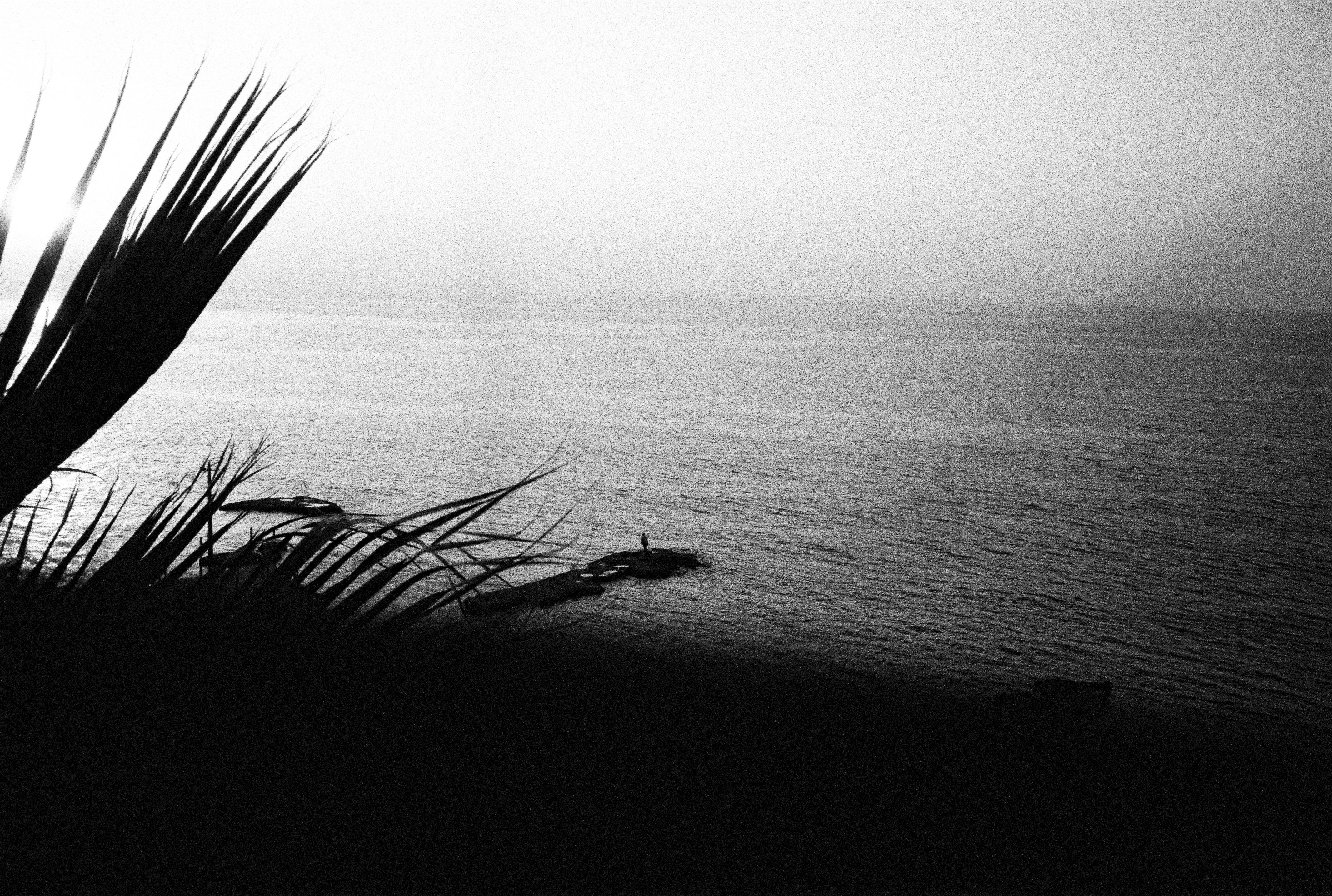
In your concepts, time seems as important as space (so the latest album title in Arabic means “Now!”), in the sense that when you give the impression of a place, it’s always the place in the moment or period of time. Do you think your work in and about Greece and Turkey would be very different, if you would record these albums today?
Frédéric: This is a good remark about space and time. I guess all of our albums get this pulsation of some contemporary urgency as a common language. Personally, I’m not that much nostalgic to regularly think backward inside our discography, I’m more looking forward. We did the best we could in the tempo we had for every record we made; I’m happy and proud about that, also that we never gave up. Last time that I was listening back to our first album was when “AL-’AN!” was just released, and I was thinking that some songs from “S/T” could have been shorter, that sometimes we were maybe a bit too self-indulgent with ourselves; at the time we were really into this first fragile transcription of the improvisation process, discovering our global sound, wanting to give it to the audience in the most “pure” way, timewise at least… Also, probably now with “AL-’AN!”, using some sessions we improvised with local musicians as basic material, we may think that we could have done the same for “ÜTOPIYA?” or our first album. Maybe were we not yet ready for this? I don’t know. As I said, I don’t care about this that much, I prefer to be excited by the now and the future rather than to dissect our past discography.
Stéphane: We were digging much more for this album, maybe because we stayed over there so much longer than in Greece and Turkey. But the idea wasn’t the same at the time. We didn’t really had one. When Frederic went to Greece with Stéphane Charpentier for the first time, it wasn’t even planned that we’ll make an album. He just came back and asked me if I would be interested to compose some music for a possible film. This is really different, the band came up after that. Then he went to Turkey on his own and then joined me in Sicily for the second. This time we went to Lebanon together with our friends Grégoire Couvert and Grégoire Orio, the film makers duo AS HUMAN PATERN. So I would say that the process is always different. It matches a certain desire at a certain time.
There are several tracks with recitations by G.W.Sok on your records, which all more or less deal with the marginality of the human race and Planet Earth. In my perception, “Ütopiya / On Living”, “The Strangest Creature on Earth” and “Through the Speech of Stars” in all their unsparing nature contain also something like a hidden tenderness and compassion. Would you say that there is some specific relation between them and the particular album?
Frédéric: Of course. We’re choosing the specific poems for/with Jos aka G.W.Sok. We’re mainly playing instrumental music so each time, when words and vocals appear somewhere in our sound, it has to be something. For the field recordings, as for the poetry we use, it has to be part of a kind of narration / story in the album. First time that we asked -and met- Jos was for the song “Ütopiya / On Living”. We sent him a rough mix of the instrumental track and two extracts from poems by Turkish author Nazim Hikmet translated into English, and Jos naturally found his way as of it was his own text. Playing live during the “ÜTOPIYA?” Tour, we used some words extract from the Domenico’s monolog in Tarkovski’s “Nosthalgia” for a track like ‘Someone Must Shout That We Will Build The Pyramids’. In my opinion, spoken words are a powerful way of putting light on tiny and individual emotions, and G.W.Sok is a maestro in the way he’s interpreting those poems with us. ‘Through The Speech Of Stars’ as ‘The Strangest Creature On Earth’ were just recorded in one take. Passion and compassion, tenderness, empathy, it’s exactly all of these.
Stéphane: It’s true, Jos got this talent and the experience to get a text and turn it into something bigger. But he works as hard as we do. He always check the meaning of the poems, when sometimes he got some difficulties, he will tell it to us, cut into it, turns it into something of his own. Then he feels more free to interpret, and the results are always amazing, far beyond from what we’re expecting! The tenderness is here, it’s also true. It’s into the poems, but also in him. He did so many things, so many shows, travelled so much. He could be just bored witha big head and stuff like that. He’s just the opposite. A cultivated person, polite, curious, gentle and sweet. He’s never complaining about anything, he’s always fair and he still fights for his opinions. He’s a great man. We have so much respect for him and for what he represents, as a musician and a human being.
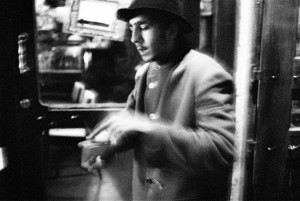 If you had to describe Oiseaux-Tempête in your own words besides the typical music terminology, how would you call what you do?
If you had to describe Oiseaux-Tempête in your own words besides the typical music terminology, how would you call what you do?
Frédéric: Epiphanies!
Stéphane: Some bright tales from different places, time and locations, from and for our dead.
Are there already some new musical or geographical journeys on your schedule?
Frédéric: For the moment, we’re more thinking about a second half of a live tour which could bring us next October / November from France and Belgium again to Germany, Netherlands, probably Poland and the UK, maybe up to Montreal! We should go back to Beirut to play next April as well. And try to rest in between of these and the other projects we have… The plan is to get no plan!
Stéphane: That’s it!
(A.K. & U.S.)
Fotos: Frédéric D. Oberland & As Human Pattern
